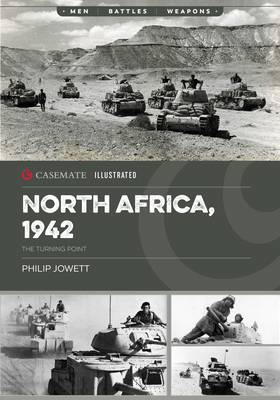
- Retrait en 2 heures
- Assortiment impressionnant
- Paiement sécurisé
- Toujours un magasin près de chez vous
- Retrait gratuit dans votre magasin Club
- 7.000.0000 titres dans notre catalogue
- Payer en toute sécurité
- Toujours un magasin près de chez vous
40,45 €
+ 80 points
Description
Chronicles Rommel's North African campaign in 1942, detailing his early victories, eventual setbacks, and the decisive Allied counterattacks that forced his retreat into Tunisia.
At the start of 1942, the Axis and British armies had been fighting officially since June 1940 and 1941 was a frustrating year which ended with the withdrawal of Rommel back into Western Cyrenaica in Libya. In January 1942 Rommel launched his "Great Offensive," which saw the Axis forces on the Libya-Egypt border. For the next few months, Rommel's forces were in the ascendancy and he was at the height of his military power. His military masterpiece at the battle of Gazala in late May and early June resulted in a major victory for the Axis, and led to the conquest of Rommel's long-held objective--Tobruk. When the Axis took the port of Tobruk in June, Rommel was feted by the German public and was promoted to the rank of field marshal by a grateful Adolf Hitler. During the summer of 1942, however, the pendulum swung in favor of the British and their new allies, the USA. As new tanks and aircraft began to arrive from the USA, along with reinforcements, the Axis war effort was suffering from a shortage of German and Italian tanks, artillery and aircraft.
By late summer, an ill and worn-out Rommel faced a new and determined enemy commander--General Montgomery. New aircraft enabled the RAF to gain air superiority and helped them to push the Luftwaffe and Regia Aeronautica out of the North African skies. Battles at El Alamein in July and then October proved decisive, and other clashes at Alam Halfa wore down Axis resistance. The body blow for Rommel and his Afrika Korps was the invasion of French North Africa, Operation Torch. This successful operation saw the U.S. Army moving east towards Rommel's Western Front in Libya. Attacked on two fronts, Rommel decided to give up on Libya and withdrew his remaining troops into the French territory of Tunisia where they would continue to fight the gathering Allied armies in the early months of 1943.
At the start of 1942, the Axis and British armies had been fighting officially since June 1940 and 1941 was a frustrating year which ended with the withdrawal of Rommel back into Western Cyrenaica in Libya. In January 1942 Rommel launched his "Great Offensive," which saw the Axis forces on the Libya-Egypt border. For the next few months, Rommel's forces were in the ascendancy and he was at the height of his military power. His military masterpiece at the battle of Gazala in late May and early June resulted in a major victory for the Axis, and led to the conquest of Rommel's long-held objective--Tobruk. When the Axis took the port of Tobruk in June, Rommel was feted by the German public and was promoted to the rank of field marshal by a grateful Adolf Hitler. During the summer of 1942, however, the pendulum swung in favor of the British and their new allies, the USA. As new tanks and aircraft began to arrive from the USA, along with reinforcements, the Axis war effort was suffering from a shortage of German and Italian tanks, artillery and aircraft.
By late summer, an ill and worn-out Rommel faced a new and determined enemy commander--General Montgomery. New aircraft enabled the RAF to gain air superiority and helped them to push the Luftwaffe and Regia Aeronautica out of the North African skies. Battles at El Alamein in July and then October proved decisive, and other clashes at Alam Halfa wore down Axis resistance. The body blow for Rommel and his Afrika Korps was the invasion of French North Africa, Operation Torch. This successful operation saw the U.S. Army moving east towards Rommel's Western Front in Libya. Attacked on two fronts, Rommel decided to give up on Libya and withdrew his remaining troops into the French territory of Tunisia where they would continue to fight the gathering Allied armies in the early months of 1943.
Spécifications
Parties prenantes
- Auteur(s) :
- Editeur:
Contenu
- Nombre de pages :
- 128
- Langue:
- Anglais
- Collection :
Caractéristiques
- EAN:
- 9781636246116
- Date de parution :
- 15-05-26
- Format:
- Livre broché
- Format numérique:
- Trade paperback (VS)
- Dimensions :
- 178 mm x 254 mm

Seulement chez Librairie Club
+ 80 points sur votre carte client de Librairie Club
Les avis
Nous publions uniquement les avis qui respectent les conditions requises. Consultez nos conditions pour les avis.





